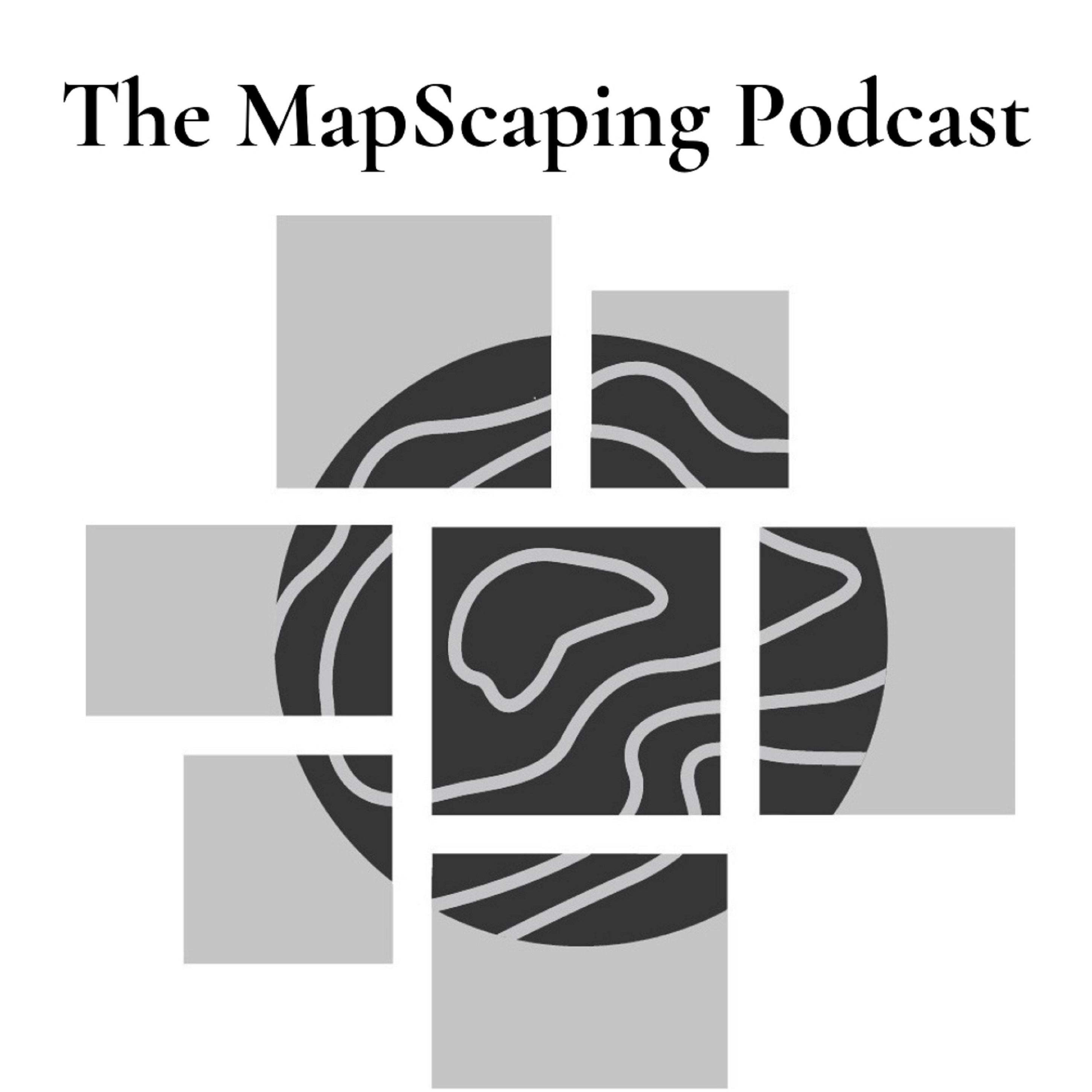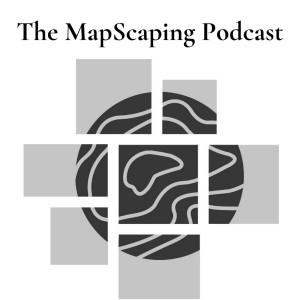

A podcast for geospatial people. Weekly episodes that focus on the tech, trends, tools, and stories from the geospatial world. Interviews with the people that are shaping the future of GIS, geospatial as well as practitioners working in the geo industry. This is a podcast for the GIS and geospatial community subscribe or visit https://mapscaping.com to learn more
A podcast for geospatial people. Weekly episodes that focus on the tech, trends, tools, and stories from the geospatial world. Interviews with the people that are shaping the future of GIS, geospatial as well as practitioners working in the geo industry. This is a podcast for the GIS and geospatial community subscribe or visit https://mapscaping.com to learn more
Episodes

Friday Jan 26, 2024
Introduction to Cloud Native Geospatial
Friday Jan 26, 2024
Friday Jan 26, 2024
Alex Leith is a Digital Earth Architect and in this episode, you will learn what Infrastructure as code is - hint it is the opposite of the "clicky-clicky" and so much more!
Connect with Alex here https://auspatious.com/
Recommended Listening
Cloud-Optimized Point CLounds
https://mapscaping.com/podcast/cloud-optimized-point-clouds/
Cloud Native Geospatial
https://mapscaping.com/podcast/cloud-native-geospatial/
Planet Scale Tiled Maps without a Server
https://mapscaping.com/podcast/planet-scale-tiled-maps-without-a-server/
What is Modern GIS

Tuesday Jan 09, 2024
GeeMap
Tuesday Jan 09, 2024
Tuesday Jan 09, 2024
GeeMap is an open-source Python library that provides tools for interactive mapping with Google Earth Engine (GEE), which is a platform for earth science data and analysis ... and today you are going to hear from the creator of GeeMap!
Connect with Qiusheng Wu here: https://wetlands.io/
This episode is sponsored by Planet
learn more at https://www.planet.com/gis/
Recommended Listening
Introduction to Google Earth Engine
https://mapscaping.com/podcast/introducing-google-earth-engine/
Introduction to Sentinel Hub
https://mapscaping.com/podcast/sentinel-hub/
Planet - Imaging everything every day ( almost )
https://mapscaping.com/podcast/planet-imaging-everything-every-day-almost/
Introduction to Microsoft's Planetary Computer
https://mapscaping.com/podcast/the-planetary-computer/

Wednesday Dec 27, 2023
GPS Reimagined
Wednesday Dec 27, 2023
Wednesday Dec 27, 2023
GPS reimagined?
Why do we need to reimagine GPS? ... Is it broken?
Recommended Podcast Episodes
How Google Calculates Your Location
https://mapscaping.com/podcast/how-google-calculates-your-location/
From GNSS To VPS
https://mapscaping.com/podcast/from-gnss-to-vps/
Navigating The Past Present and Future of GNSS
https://mapscaping.com/podcast/navigating-the-past-present-and-future-of-gnss/
SatelliteBased Augmentation System - A Base Station In The Sky
https://mapscaping.com/podcast/satellite-based-augmentation-system-a-base-station-in-the-sky/

Wednesday Dec 20, 2023
The Business of QGIS Development
Wednesday Dec 20, 2023
Wednesday Dec 20, 2023
Nyall Dawson is a QGIS developer, cartographer, and owner and founder of North Road, a company specializing in open-source geospatial software.
His journey into geospatial began with personal interests in mapping and cartography, which later evolved into a business called North Road.
But that's not why I wanted to make this episode for you, I wanted to share this story with you because it could be your story too.
You could decide to have a story that starts with contributing to something you care about, which leads to you becoming a known expert within a community that cares about the same thing and evolves into paid opportunities. That could be your story too!
You can connect with Nyall here:
https://twitter.com/nyalldawson
https://www.linkedin.com/in/nyall-dawson-18b6016a/
Sponsored by Planet
Learn more at www.planet.com/gis
Recommended Podcast Episodes
Planet
https://mapscaping.com/podcast/planet-imaging-everything-every-day-almost/
Monetizing an open-source geospatial project
https://mapscaping.com/podcast/monetizing-an-open-source-geospatial-project/
Being self-employed in Earth Observation
https://mapscaping.com/podcast/being-self-employed-in-the-earth-observation-sector/
Geospatial Side Hustles
https://mapscaping.com/podcast/geospatial-side-hustles/
Self Employment in the GIS Industry
https://mapscaping.com/podcast/self-employment-in-the-gis-geospatial-industry/
A Business built on Open Source GIS
https://mapscaping.com/podcast/a-business-built-on-open-source-gis/

Thursday Dec 14, 2023
Making Beautiful Maps In Felt
Thursday Dec 14, 2023
Thursday Dec 14, 2023
This episode is all about making beautiful maps ... I am not a cartographer but my guest Mamata Akella is a professional cartographer at Felt!
So today on the podcast we are talking about Essential Elements of Map Design:
Which of course starts with questions like - who is it for, what is it for and how do we get it to them?
And then moves on to Visual Hierarchy, Zoom-Based Styling, Color Palettes, and Interpretation
We discuss a few practical examples during the conversation and you can find links to those in the show notes
Recommended Listening
https://mapscaping.com/podcast/felt-upload-anything/
https://mapscaping.com/podcast/communicating-with-maps-the-art-of-cartography/
https://mapscaping.com/podcast/full-stack-cartography/

Thursday Dec 07, 2023
Planet - Imaging Everything, Every Day ... Almost
Thursday Dec 07, 2023
Thursday Dec 07, 2023
Planet manufactures and manages the world’s largest constellation of earth observation satellites!
Imaging “Just about everywhere on earth just about every day – Making change visible, accessible, and actionable”
… and the hope of this episode is to help you understand how they do that – along the way
- you will hear about their two constellations and how they work together
- Learn the difference between ghost ships and dark ships and find out that there are very few ground control points in the ocean and why that matters
- Find out what this means for GIS and permit enforcement.
For more information go to https://www.planet.com/gis/
Recommended Podcast Episodes
Hyperspectral vs. Multispectral
https://mapscaping.com/podcast/hyperspectral-vs-multispectral/
NICFI Program
https://mapscaping.com/podcast/reduce-and-reverse-tropical-forest-loss-with-nicfi/
Synthetic Data
https://mapscaping.com/podcast/synthetic-data-for-real-problems/
Labels Matter
https://mapscaping.com/podcast/labels-matter/

Thursday Nov 30, 2023
Fire Mapping, Maritime Search And Wide Angle Imaging
Thursday Nov 30, 2023
Thursday Nov 30, 2023
This episode is a story about wide-angle imaging for fire mapping and maritime search but it's also a story about changing the culture and getting people to trust a new way of doing things.
My guest today is Alison Harrod - mission success manager at a start-up called Overwatch imaging
Whenever I work with a company like Overwatch Imaging it is hard to know which story to tell, we could just as easily have made an episode about AI and object detection or about smart sensors because they do those things too.
The decision depends on the guest and their background so after meeting Alison we decided to make this episode for you and try to give you a broad overview of what wide-angle imaging is and how it's used in the context of fire mapping and maritime search.
...but It's one thing to have a technology and it is another thing entirely to get people to use it … as you will hear fire mapping is not “a move fast and break things kind of situation”
Connect with Alison here!
https://www.linkedin.com/in/alisonharrod/
https://www.overwatchimaging.com/
Other relevant podcast episodes that you might enjoy
Thermal Imagery From Space
https://mapscaping.com/podcast/thermal-imagery-from-space/
Finding Water Leaks From Space
https://mapscaping.com/podcast/finding-water-leaks-from-space/
Cube Satellites Of The Stratosphere
https://mapscaping.com/podcast/cube-satellites-of-the-stratosphere/

Wednesday Nov 22, 2023
Personal Branding in Geospatial
Wednesday Nov 22, 2023
Wednesday Nov 22, 2023
It's not about becoming an influencer it's about creating opportunities for yourself
In this episode, we tackle the common misconception that personal branding is solely for influencers, revealing how it's actually about creating the right visibility and opportunities in your professional sphere.
Helena Merschdorf shares her unique insights, drawing from her rich background in GIS and marketing, and discusses:
- Solving the Obscurity Problem: Discover how personal branding can help you get noticed by the right people, not just everyone.
- Effective Communication in Technical Fields: Learn the art of conveying complex GIS concepts to non-experts.
- Defining and Building Your Personal Brand: Uncover the essence of personal branding and how to strategically develop it.
- Overcoming Challenges: Helena offers guidance on tackling imposter syndrome and finding your niche in the vast world of GIS.
- Choosing the Right Platforms: Get tips on selecting the best channels for your personal branding efforts based on your target audience.
- Success Stories and Strategies: While specific examples aren't named, learn about the different levels of personal branding success and what might work for you.
This episode is not just about building a personal brand; it's about leveraging that brand to carve a unique path in the geospatial industry.
Connect with Helena here
https://www.linkedin.com/in/helenamerschdorf/
Other relevant podcast episodes
Rebranding GIS and Geospatial
https://mapscaping.com/podcast/rebranding-gis-geospatial/
Python Maps
https://mapscaping.com/podcast/python-maps/
Getting Your Dream Job In Earth Observation
https://mapscaping.com/podcast/getting-your-dream-job-in-earth-observation/

Wednesday Nov 15, 2023
Entity Resolution with Placekey
Wednesday Nov 15, 2023
Wednesday Nov 15, 2023
Entity resolution is the process of matching and merging records from different sources that refer to the same entity.
today's episode is about entity resolution for place data, why you might want to do that, and what any of this has to do with the dollar, Unix time and the idea that If data is really driving innovation, join keys are going to become more valuable.
Today's guest is Auren Hoffman
https://www.linkedin.com/in/auren/
https://www.youtube.com/@worldofdaas
If you want to try Placekey for yourself go to https://www.placekey.io/
If you want to learn more about SafeGraph listen to this podcast episode
https://mapscaping.com/podcast/building-geospatial-truth-sets/

Wednesday Oct 04, 2023
Strategic Buy-In For FOSS4G
Wednesday Oct 04, 2023
Wednesday Oct 04, 2023
Embracing Open-Source Geospatial Technology is easy as an individual but what if you want your organization to use FOSS4G
How do you get strategic buy-in?
It turns out that the software does not sell itself and that even in the age of AI we still have to convince a human if we want organizational change to to happen.
I think the temptation is to say hey look at this long list of specifications and notice how FOSS4G is often better or equal to the close source equivalent.
Or hey look at the price tag … it costs nothing which is way cheaper than this other thing which costs more than nothing.
While this might be all the argumentation you need in some cases … in general, making change happen is hard, and it's going to require more than that.
That's why I have invited Todd Barr back on the podcast to walk us through what it takes to get an organization to Embrace Open-Source Geospatial Technology.
Here are a few of the key points
- Getting buy-in for open-source software and addressing concerns about security and IP protection
- Perspectives of External and internal stakeholders on open-source Software
- Importance of collaboration, empathy, and understanding in decision-making and stakeholder management
- Challenges of implementing open source technology in a corporate environment
- Benefits of using open source solutions, such as faster analysis, increased stability, and flexibility for innovation
- Accessibility and support in open source communities, including direct interaction with developers and availability of external consultants
- Customization and development work required for creating vertical solutions with open-source components
- Finding skilled developers and training them in geospatial technology
- Cost-saving advantages of open source technology in cloud computing
- Leading arguments for implementing open source software: cost savings and freedom to modify and customize
- Advocacy for supporting and integrating with the open source community.
The last time Todd was on the podcast we talked about Leadership and Mentorship in the Geospatial community
https://mapscaping.com/podcast/skills-leadership-mentorship-and-the-geospatial-community/
If you are interested in FOSS4G you might enjoy these previous episodes
A Business built on Open Source GIS
https://mapscaping.com/podcast/a-business-built-on-open-source-gis/
Monetizing an open-source geospatial project
https://mapscaping.com/podcast/monetizing-an-open-source-geospatial-project/
Or just scroll through the archive to find episodes about QGIS, PostGIS, Geoserver, Geonode, Python, and a bunch of other open-source projects
I could use some support! please consider supporting this podcast on Patreon
https://www.patreon.com/MapScaping
Some more episodes you might enjoy
ESRI, GIS careers, Geospatial Data Science
QGIS, Geospatial Python, ArcGIS Pro
Google Maps, Geomatics, Cartography
Location Intelligence, Mapping